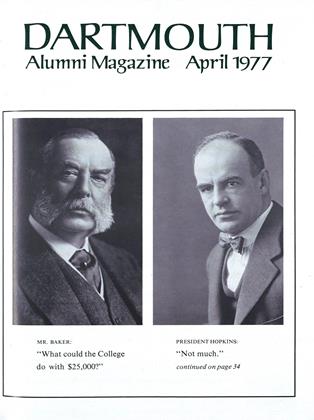Doug Storer '21. Amazing But True: Stories Behind the Stamp. N.Y., Pocket Books, 1976. 208 pp. $1.50. The ninth Amazing But True book is jam-packed with long-forgotten oddments of history concerning the extraordinary people and bizarre events commemorated by postage stamps. Trivia players take note: Navy hero John Paul Jones's body lay sealed in a lead coffin flooded with alcohol in an unmarked Paris grave from 1792 to 1905, when it was discovered and returned to Annapolis for honored interment; the advice for longevity of Javier Pereia, a Colombian who lived to be almost 170 years old, is "Don't worry, drink lots of coffee, and smoke a good cigar." Not bad advice. If Doug Storer heeds it, by the time he is 170 a little mathematical extrapolation suggests that he will have published at least 49 Amazing But True books.
Herbert N. Schneidau '57. Sacred Discontent:The Bible and Western Tradition. Louisiana University Press, 1976. 331 pp. $15.00. Professor Schneidau's new book is nothing if not eclectic. Drawing upon the evidence of such wide-ranging disciplines as Biblical archaeology, anthropology, history, and literary criticism, Schneidau finds the ultimate source of modern alienation in Western culture in the skeptical, probing, self-critical habits of thought - the "sacred discontent" - of the Old Testament writers. "From its own attitude to itself," he concludes, "conditioned by the Bible's warnings against pride and self-aggrandizement, proceeds Western culture's characteristic pattern: on the one hand dynamic and dominant, on the other hand restless and unfulfilled .... The Western psyche, to borrow a phrase, has the iron constitution of a chronic invalid. It enjoys poor health." Schneidau is a professor of English at University of California, Santa Barbara.
H. Geoffrey Moser '60. Love Dust:Translations of an Alchemist. Philadelphia, Dorrance & Co., 1977. 192 pp. $5.95. Scientists who turn to poetry to express their perceptions of the complexity and wonder of their experience are rare. A research biologist, Moser tries to "translate" into language and poetic form something of the scientist's apprehension of molecular and chemical structures. He is a linguistic innovator; he experiments with words much as a chemist experiments with elements in his laboratory, combining and recombining them into the startling new verbal compounds which are his poems. One such new form is the "lattice poem," which, Moser says, has "a primary, secondary, and tertiary structure that is analogous to the infrastructure of a molecule and should vibrate in and out of focus." Moser's poems are not for the indolent or passive reader; they require active mental effort. But at their best they do indeed "vibrate."
Robert Eckert. '65. Portrait of a Young ManNaked. Geneva: Editions du Tricorne, 1977. 37 pp., $7.00 plus $1.50 handling; limited ed., signed, $30. This first book of poems by Robert Eckert, who chooses to use the pseudonym Robert Sand, is dedicated "To Dartmouth College and Hanover, whose poignant spring of '63 gave me birth as poet; and to the persons, places and other living things which thereafter inspired these writings." This is a modest beginning by a lawyer. The first poem reads "College is a place to find oneself, / but where did we lose him?" All of the poems are in simple language, the best being "Love Poem." One is in French, "Un True." Toward the end he writes about Hawaii. These poems give an easy pleasure in an attractively illustrated short book.
 View Full Issue
View Full Issue
More From This Issue
-
 Feature
FeatureAffirmative Action
April 1977 By MARY ROSS -
 Feature
FeatureMr. Hopkins Builds a Library
April 1977 By CHARLES E. WIDMAyER -
 Feature
FeatureIf you spent the winter in Buffalo, Imagine This
April 1977 By THOMAS SHERRY -
 Feature
FeatureThe Road Not Taken
April 1977 By JOHN S. MAJOR -
 Article
ArticleBetween Seasons
April 1977 By JACK DEGANGE -
 Article
ArticleTopeka Takes On the Hun
April 1977 By NICK SANDOE '19
Richard Eberhart '26
-
 Letters to the Editor
Letters to the EditorLetters to the Editor
September 1976 -
 Article
ArticleLines to the Dead in an Old New Hampshire Grave Yard
November 1956 By RICHARD EBERHART '26 -
 Books
BooksSKELETON OF LIGHT.
December 1961 By RICHARD EBERHART '26 -
 Books
BooksSPUN SEQUENCE.
July 1962 By RICHARD EBERHART '26 -
 Feature
FeaturePOETRY AT DARTMOUTH
MARCH 1963 By RICHARD EBERHART '26 -
 Books
BooksSELECTED POEMS.
MAY 1966 By RICHARD EBERHART '26







